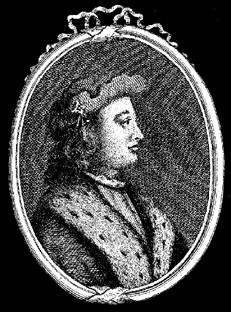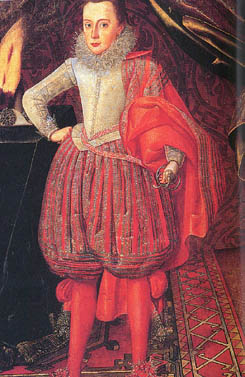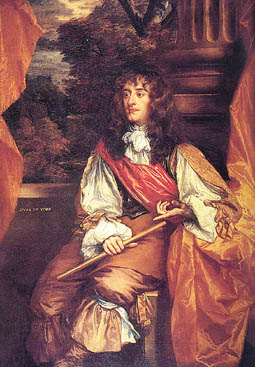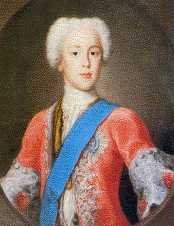 David I (1124 - 1153)
David I (1124 - 1153)Reproduced from "The Kings and Queens of Scotland" by Nicholas Best - See our "Book Review" for further details.
Mary, Queen of Scots Home Page
One of Scotland's finest kings, David was born in 1084 and grew up with a strong sense of duty towards his subjects. He was religious and fair-minded, a keen gardener and an energetic modernizer of the state. The reforms he imposed on Scotland did much to prevent the country from being absorbed by England in later centuries. Through his marriage to an English noblewoman, David was also a powerful force in England, with large estates in the Midlands and a claim to lands in Northumbria. After Henry I's death, David took advantage of English unrest to push Scotland's borders southwards, the furthest south they would ever go. As both man and king, he was greatly respected by everyone who knew him. It is arguable that Scotland was never again as highly regarded as it was during his reign.
William's son, Alexander (born in 1198), was known as "The Peaceful", a nickname he did not entirely deserve. He chopped the hands and feet off rebels or had them torn apart by horses. The heads of his enemies were delivered to him at court and he eliminated a rival claimant to the throne, an infant girl, by having her brains dashed out against the market cross in Forfar. He was a competent ruler nevertheless, who codified the country's laws and enforced them in all corners of the realm. His first wife was the daughter of England's King John, but this did not prevent him from siding with the English barons against the king. He believed in the rule of law and was present at the signing of Magna Carta in 1215. The borders he agreed with England are still in force today.
Born in 1274, Robert the Bruce was a descendant of David I. In the chaos following John Balliol's removal, he changed sides five times, sometimes supporting Sir William Wallace, sometimes the English king. He was so disheartened by the experience that it was only the sight of a spider spinning its web, according to legend, that prompted him to keep trying and not to give up hope. With no other obvious candidate for the throne, Robert was declared king in 1306. Luckily for him, Edward I of England died in 1307, to be succeeded by the weaker Edward II. Robert rallied the Scots against the English, crushing them at Bannockburn in 1314 and forcing them to recognize Scotland as an independent state. He arranged for his heart to be cut out after his death and taken on a crusade. Robert died of leprosy in 1329.
 Charles I (1625 - 1649)
Charles I (1625 - 1649)
Grandson of Mary, Queen of Scots
Although he grew up in England, Charles (born in 1600) had a Scots tutor and always took a keen interest in the country. Unfortunately, he had little talent for kingship, alienating people on both sides of the border with his insistence that monarchs were appointed by God and had a divine right to rule. When the Civil War broke out in 1641, many Scots fought for the king, but others fought equally bravely for Parliament. After the Royalist defeat, Charles was offered an honourable peace but tried to start the war again. Exasperated, the Parliamentarians put him on trial for waging war on his own people. He was found guilty by a fixed vote and publicly beheaded in 1649. His execution horrified the Scots, who wished him no personal harm and were outraged that the English had killed a Scottish king without asking permission.
 Charles II (1651 - 1685)
Charles II (1651 - 1685)
Great-grandson of Mary, Queen of Scots
England was a republic for eleven years after the execution of Charles I. In Scotland, however, his son Charles II (born in 1630) was crowned with great pomp in 1651. A few months later, Charles led a Scots invasion of England, only to be defeated by Oliver Cromwell and the Parliamentary army at Worcester. He fled to France and never saw Scotland again. Restored to England in 1660, Charles resolved never to go on his travels again. The Civil War of his childhood left him deeply insecure, determined to make up for lost time by enjoying himself to the full. He had scores of mistresses and fathered numerous illegitimate children. He was much loved by the English as a "Merry Monarch", but never cared much for Scotland, leaving it to his representatives to run the country on his behalf.
 James II (1685 - 1689)
James II (1685 - 1689)
Great-grandson of Mary, Queen of Scots
Born in 1633, James succeeded his brother Charles II at the age of fifty-two. Although he had made two earlier trips to Scotland, he never visited the country as king and was the first monarch in almost 400 years not to be crowned there. He was also a Roman Catholic convert - a recipe for disaster in a fiercely Protestant country, which detested any kind of popery. At first the Scots gave him their loyal support. But James went too far when he allowed Catholic officers to join the English army and asked the Scottish Parliament to repeal Scotland's anti-Catholic legislation. The English invited his daughter, Mary, and her Protestant husband, William of Orange, to rule in his place. Scotland's Parliament debated whether to follow suit. From exile in France, James sent the Scots such a tactless ultimatum that they sided with William and Mary. James died in 1701.
 James Edward,
James Edward,
The "Old Pretender"
Great-great-grandson of Mary, Queen of Scots
James Edward, son of James II, did not reign as his father had been removed in favour of his sister Mary. Many Scots felt that this removal was unconstitutional, and that James Edward was therefore the legitimate ruler. His party were the Jacobites who longed for his return. In fact, James might have succeeded his sisters Mary and Anne if he had agreed to renounce Catholicism, but he refused believing that he would one day be legitimately restored, as his uncle Charles II had been. Dull and uncharismatic, he landed in Scotland too late to play any meaningful part in the Jacobite rebellion of 1715. He fled back to France and died a broken man in 1766.
 Charles Edward,
Charles Edward,
"Bonnie Prince Charlie,
the Young Pretender"
Great-great-great-grandson of
Mary, Queen of Scots
Like his father, James Edward, Charles Edward did not reign either. Born in exile in 1720, Bonnie Prince Charlie was good-looking and romantic, a far more appealing figure than his father. He inspired the Jacobite rebellion of 1745, landing in Scotland with just seven companions in a desperate attempt to regain the crown for his family. The rebellion might have succeeded: a Jacobite army won the battle of Prestonpans and invaded England as far as Derby before deciding to withdraw. It was pursued by professional English troops who crushed the rebellion at Culloden in 1746. Charles spent five months on the run, hidden by Flora MacDonald and other Highlanders, before escaping to France. He turned to the bottle and rapidly lost his good looks. In 1750 he visited London in disguise, secretly converting to Protestantism in an attempt to woo the English. Deserted by everyone except his daughter, he died miserably in 1788.